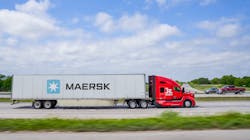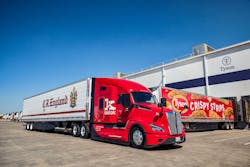Kodiak expands Maersk autonomous freight lane from Houston to Oklahoma
Kodiak Robotics has expanded an autonomous trucking lane between Houston and Oklahoma City for global logistics company A.P. Moller-Maersk. According to Kodiak, this is the first autonomous freight network to connect the Texas port city to Oklahoma.
“Over the last four years, we have delivered over 4,000 loads for our partners using our autonomous technology between Dallas and Houston, Austin, San Antonio, Oklahoma City, and Atlanta,” Michael Wiesinger, Kodiak’s VP of commercialization, told FleetOwner. “We have made tremendous technical and operational progress over that time and learn a ton from the real-world operational challenges we see on a daily basis. It’s not enough to build a perfect technology in a lab—we need a solution that works for our partners in real-world operations.”
Kodiak and Maersk have collaborated on autonomous freight transportation since November 2022 through Maersk’s Global Innovation Center program. On the Houston-to-Oklahoma City lane, Kodiak has delivered eight weekly loads—with a safety operator behind the wheel—since August.
“Teaming with Kodiak enables Maersk to stay at the forefront of innovative solutions,” said Erez Agmoni, Maersk’s global head of innovation logistics and services. “Autonomous trucks will play an instrumental role in digitizing the supply chain. We expect self-driving trucks to ultimately become a competitive advantage for Maersk as we execute on our strategy to provide customers with a sustainable, end-to-end logistics solution across air, land, and sea.”
See also: The humanless difference: Autonomous efficiency goes beyond fuel savings
How the Houston to Oklahoma City AV lane operates
Kodiak and Maersk run four round trips per week on a 24-hour-a-day, four-day-a-week basis, moving consumer products on 53-foot trailers hauled by Kodiak tractors. Kodiak uses data from 450-mile one-way trips as part of the Kodiak Partner Deployment Program, designed to help companies learn how Kodiak’s self-driving trucks could become part of their logistics operations.
“Each day, a Kodiak truck leaves from Dallas and goes to Houston to pick up a load at the Houston Maersk facility,” Wiesinger explained. “The truck then returns to Dallas and swaps drivers. The new driver takes the truck and trailer to Oklahoma City, drops it off, picks up an empty trailer, and heads back to Dallas. That loop takes approximately 24 hours, including drive time, inspections, detention, and rest breaks.”
Kodiak has two autonomous truckports in the Southern U.S.: in Dallas and Atlanta, where freight can be dropped off by regional drivers operating on the first or last mile. Those trailers are picked up by Kodiak trucks that move them along various autonomous freight lanes.
“Hauling commercial freight gives us the opportunity to work together to integrate Kodiak’s autonomous trucking solution into Maersk’s operations,” Don Burnette, Kodiak founder and CEO, said. “As the first autonomous trucking company to establish this new commercial lane between Houston and Oklahoma City, we are demonstrating our team’s ability to introduce new lanes and bring new efficiencies to the entire logistics industry.”
Wiesinger noted that every mile a Kodiak truck travels helps its engineers improve the self-driving system known as the Kodiak Driver. With more than nine in 10 highway crashes caused by human error, Kodiak and other AV companies say their robotic trucks would improve road safety.
See also: Kodiak pilots autonomous truck roadside inspection program
Kodiak’s fleet partnerships
Each Kodiak truck has 18 sensors—including cameras, radar, and lidar—that provide the platform with a 360-degree view around the truck. Every tenth of a second, the truck evaluates the performance of more than 1,000 safety-critical processes and components in the self-driving stack and the underlying truck platform. The trucks learn in parallel, with system upgrades shared with the entire fleet simultaneously, and are not subject to environmental distractions.
Along with Maersk, Kodiak is also hauling freight for large fleets and companies, including Werner, C.R. England, Tyson, 10 Roads Express, CEVA, Forward, and Ikea.
“Integrating operations with our customers is critical to getting ourselves to a driver-out solution,” Wiesinger said. “Working with our partners allows us to ensure we’re building a solution that will solve their most acute problems. Through Kodiak’s Partner Deployment Program, we are also doing the work of determining how we will deploy this technology together. We work with our partners like Maersk to conduct a 360-degree discovery process, analyze our networks, understand their systems and operations, and pinpoint what lanes will be the best fit for Kodiak’s autonomous trucking technology and what the end-to-end operations will look like.”
He added that Maersk and Kodiak plan to explore future avenues for collaboration across Maersk’s North American logistics network.
About the Author
Josh Fisher
Editor-in-Chief
Editor-in-Chief Josh Fisher has been with FleetOwner since 2017. He covers everything from modern fleet management to operational efficiency, artificial intelligence, autonomous trucking, alternative fuels and powertrains, regulations, and emerging transportation technology. Based in Maryland, he writes the Lane Shift Ahead column about the changing North American transportation landscape.


